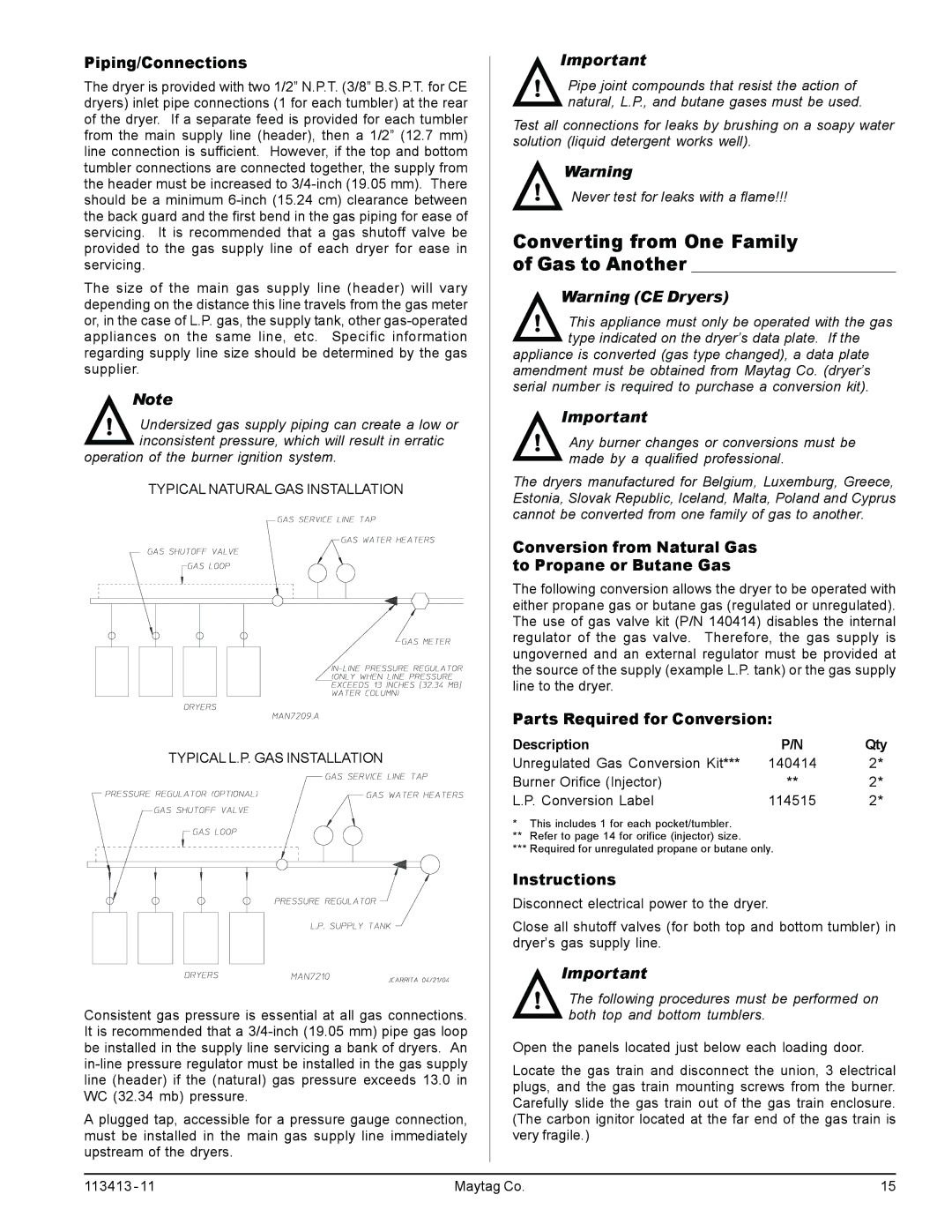
Piping/Connections
The dryer is provided with two 1/2” N.P.T. (3/8” B.S.P.T. for CE dryers) inlet pipe connections (1 for each tumbler) at the rear of the dryer. If a separate feed is provided for each tumbler from the main supply line (header), then a 1/2” (12.7 mm) line connection is sufficient. However, if the top and bottom tumbler connections are connected together, the supply from the header must be increased to
The size of the main gas supply line (header) will vary depending on the distance this line travels from the gas meter or, in the case of L.P. gas, the supply tank, other
Note
!Undersized gas supply piping can create a low or inconsistent pressure, which will result in erratic
operation of the burner ignition system.
TYPICAL NATURAL GAS INSTALLATION
TYPICAL L.P. GAS INSTALLATION
Consistent gas pressure is essential at all gas connections. It is recommended that a
A plugged tap, accessible for a pressure gauge connection, must be installed in the main gas supply line immediately upstream of the dryers.
Important
!Pipe joint compounds that resist the action of natural, L.P., and butane gases must be used.
Test all connections for leaks by brushing on a soapy water solution (liquid detergent works well).
Warning
!Never test for leaks with a flame!!!
Converting from One Family
of Gas to Another ______________________
Warning (CE Dryers)
!This appliance must only be operated with the gas type indicated on the dryer’s data plate. If the
appliance is converted (gas type changed), a data plate amendment must be obtained from Maytag Co. (dryer’s serial number is required to purchase a conversion kit).
Important
!Any burner changes or conversions must be made by a qualified professional.
The dryers manufactured for Belgium, Luxemburg, Greece, Estonia, Slovak Republic, Iceland, Malta, Poland and Cyprus cannot be converted from one family of gas to another.
Conversion from Natural Gas to Propane or Butane Gas
The following conversion allows the dryer to be operated with either propane gas or butane gas (regulated or unregulated). The use of gas valve kit (P/N 140414) disables the internal regulator of the gas valve. Therefore, the gas supply is ungoverned and an external regulator must be provided at the source of the supply (example L.P. tank) or the gas supply line to the dryer.
Parts Required for Conversion:
Description | P/N | Qty |
Unregulated Gas Conversion Kit*** | 140414 | 2* |
Burner Orifice (Injector) | ** | 2* |
L.P. Conversion Label | 114515 | 2* |
*This includes 1 for each pocket/tumbler.
**Refer to page 14 for orifice (injector) size.
***Required for unregulated propane or butane only.
Instructions
Disconnect electrical power to the dryer.
Close all shutoff valves (for both top and bottom tumbler) in dryer’s gas supply line.
Important
!The following procedures must be performed on both top and bottom tumblers.
Open the panels located just below each loading door.
Locate the gas train and disconnect the union, 3 electrical plugs, and the gas train mounting screws from the burner. Carefully slide the gas train out of the gas train enclosure. (The carbon ignitor located at the far end of the gas train is very fragile.)
113413 - 11 | Maytag Co. | 15 |
